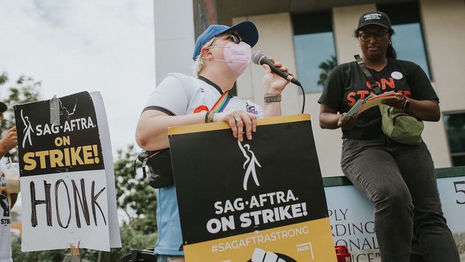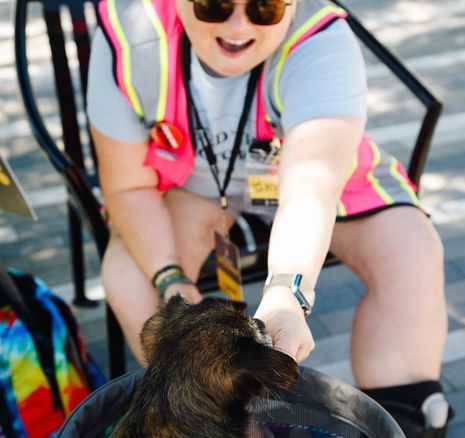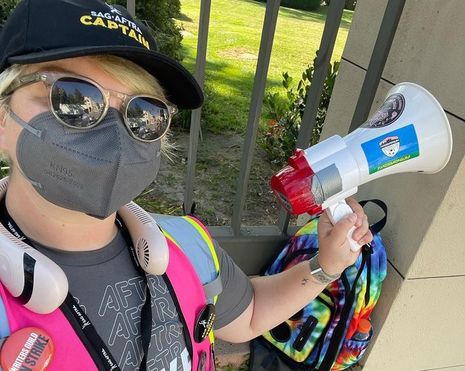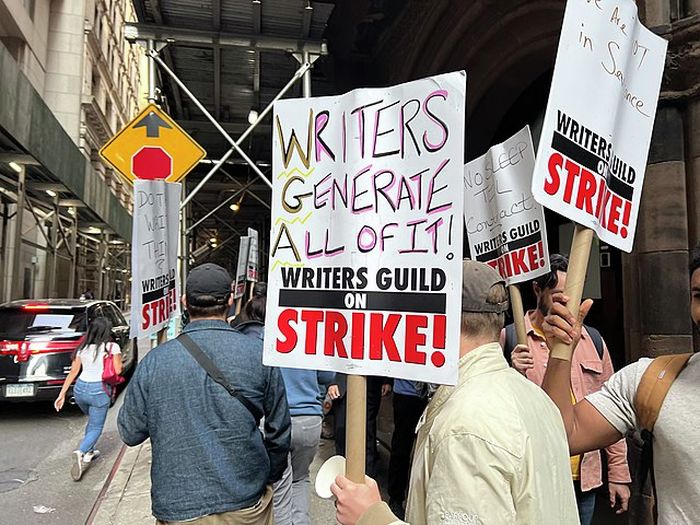‘The industry is on the backs of labour’: the SAG-AFTRA strike from the picket line
Miranda Crawford speaks to SAG-AFTRA strike captain Kylie Sparks about working the picket, AI and the struggle to make ends meet as an actor

On July 13th, the conjoined labour unions of the Screen Actors Guild and the American Federation of Television and Radio Artists (SAG-AFTRA) voted to issue strike action after the Alliance of Motion Picture and Television Producers (AMPTP) failed to agree to a renewed contract. Not only was this the biggest actors’ strike since 1980, it was also the first time since 1960 that a SAG strike had coincided with a WGA (Writers Guild of America) strike, making it a historic moment of solidarity for both unions. As the strike veered towards the two-month mark, I spoke to Kylie Sparks – an LA-based actor, writer and union member – to understand what the strike means to them.
Kylie joins my zoom call in a flurry of energy, fresh off the picket line and still in their SAG-AFTRA t-shirt and hi-vis vest. As strike captain, they have been working tirelessly to help set up tents, control crowds, and answer questions on the picket line and social media. As a member of SAG, Kylie tells me they have been “on the line since day one”: at the time of our interview SAG-AFTRA had been on strike for 57 days.
“It’s all or nothing. If we give in now our industry will be dead”
There are a multitude of grounds on which the union is striking, including disputes over wages, working conditions and the use of artificial intelligence to replicate a performer’s likeness without their consent. For Kylie, who has been a working actor for 20 years, the most important issue on the table is that of residuals – royalty payments for reruns of television shows, or bonus cheques if a film does well. At the time of the last WGA strike in 2007, streaming services such as Netflix and Hulu were only beginning to emerge in popularity, and uncertainties around their viability meant residuals were not negotiated in the deal. Now, despite streaming being firmly established in the mainstream, that old model remains, leaving actors who appear in original series by any streaming service receiving no residual payments. “Right now I am on an Emmy nominated show on a huge streamer”, says Kylie, who is obligated not to name the show nor the streaming platform. “It’s been viewed millions and millions of hours around the world, and they paid me a tenth of my quote which is ridiculous.”

Kylie explains that they still continue to make money in residuals from a show they worked on back in 2008. It’s the payment from this over a decade old show that allows them to pay their bills and medical fees – not their most recent project, despite its popularity. “I think it covered my utilities and I will receive no residuals,” Kylie despairs, explaining how residuals are essential to working US actors. Actors are not eligible for health insurance until they have a minimum earning of $26,470 and without residuals this is increasingly difficult to meet.
The emergence of streaming services has certainly changed the face of the entertainment industry, and Kylie feels strongly that people working in the industry must be accounted for. “Now we’re seeing an exodus of shows getting pulled off of streaming services for no reason, we’re seeing movies get cancelled for ‘tax write-offs’ [...] those are opportunities for folks to pay their bills”. It’s clear that Kylie does not envisage SAG-AFTRA relenting to the AMPTP. “For me personally it’s all or nothing. If we give in now our industry will be dead”.
“This world is a little too nefarious for me to trust that they will do the right thing with AI”
Kylie voices their concerns over not only the financial aspects of the current contract, but the use of artificial intelligence to replace actors. The current AMPTP proposal stipulates half a day’s pay (roughly $150) in compensation for scanning every part of an actor’s body and facial expressions, with the view to using their likeness and image in perpetuity. Not only does this grossly undermine the work of actors, with their likenesses being used to actively train AI to replicate their work, but these images will be used without the consent of the actor. Kylie ponders over the almost dystopian consequences of artificially mimicking a person’s image without their consent, citing sexual violence and the promotion of fascist ideology as extreme examples of the dangers this precedent could hold. “People say that AI is the future, but AI can also be a weapon depending on how you use it [...] this world is a little too nefarious for me to trust that they will do the right thing with AI”. Nefarious indeed, with studios ignoring the moral and ethical implications of AI in order to avoid fairly compensating their workers.

The ruthless greed of large corporations at the expense of their workers is not unique to the entertainment industry. Kylie tells me that they have had teachers, doctors and nurses’ unions all come out to the picket line to support WGA and SAG-ATRA in the name of solidarity. “It’s everywhere. If you’re not part of the 1% then we are all labour, and we have to stand united in order to get what we want, not just in our own industry but in other industries as well”. It’s a real eye-opener into the mechanics of what can seem from the outside as a highly glamourous industry. But in reality, Kylie tells me, “Not everybody is a Nicole Kidman or a Pedro Pascal, we’re not making that kind of money. We’re just making money so we can pay rent, raise a family if we want to, or go see a concert. The industry is on the backs of labour and labour is actors of all levels, from background actors to A-listers, to stand-ins, to rehearsal actors.”
The WGA have come to a deal with AMPTP, reaching what has been described as a “tentative agreement” in a joint statement. SAG-AFTRA has responded by pushing AMPTP to get back to the table and negotiate but, with so many challenges presented by the rapidly changing face of the entertainment industry, it is unclear when, or how, a fair agreement will be reached for the actors. It is evident that the writers and actors are only at the beginning of what looks to be a historic shift in the treatment of workers across all sectors of the entertainment industry.
Kylie would like it known that their opinions are entirely their own and do not represent any official statements made by SAG-AFTRA or WGA.
 News / Cambridge academics stand out in King’s 2026 Honours List2 January 2026
News / Cambridge academics stand out in King’s 2026 Honours List2 January 2026 Interviews / You don’t need to peak at Cambridge, says Robin Harding31 December 2025
Interviews / You don’t need to peak at Cambridge, says Robin Harding31 December 2025 Comment / What happened to men at Cambridge?31 December 2025
Comment / What happened to men at Cambridge?31 December 2025 Features / “It’s a momentary expression of rage”: reforming democracy from Cambridge4 January 2026
Features / “It’s a momentary expression of rage”: reforming democracy from Cambridge4 January 2026 News / Varsity’s biggest stories of 202531 December 2025
News / Varsity’s biggest stories of 202531 December 2025










